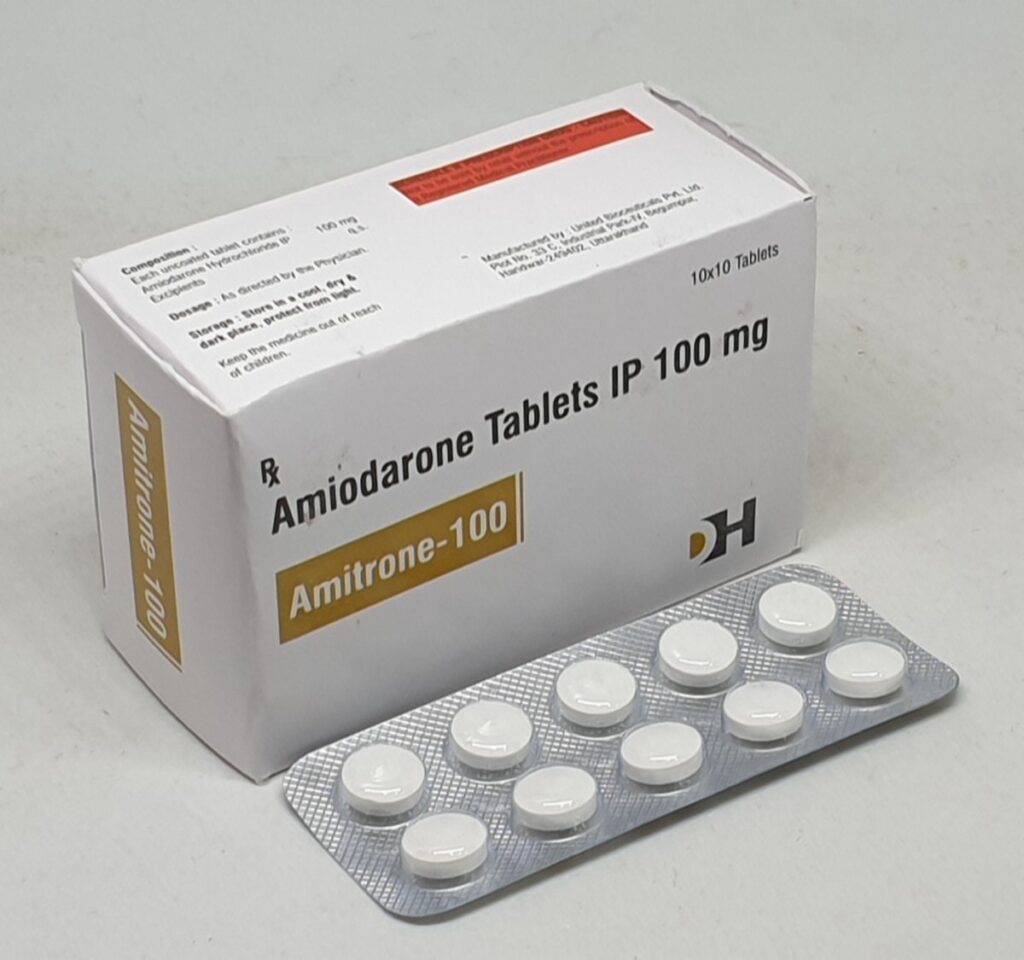📌 Medicine Name:
Amiodarone Tablet 100 mg
(Commonly available as Amiodarone hydrochloride)
📋 Description / Prescription:
Amiodarone is a prescription-only antiarrhythmic medicine used to treat and prevent various types of serious irregular heartbeats.
- Form: Oral tablet
- Strength: 100 mg
- Route: Oral
- ATC Code: C01BD01
🩺 Indications / Uses:
Amiodarone is used for:
- Ventricular tachycardia (VT)
- Ventricular fibrillation (VF)
- Supraventricular arrhythmias, such as:
- Atrial fibrillation (AF)
- Atrial flutter
- Paroxysmal supraventricular tachycardia (PSVT)
Also used in patients unresponsive to or intolerant of other antiarrhythmics.
🔬 Nature / Mechanism of Action:
Amiodarone is a Class III antiarrhythmic agent (Vaughan-Williams classification). It:
- Prolongs repolarization by blocking potassium channels
- Inhibits sodium and calcium channels
- Reduces heart rate and AV conduction
- Has beta-blocker and calcium channel blocker properties
- Acts on both atria and ventricles
⏳ Half-life: Extremely long (20–100 days)
🕒 Onset of effect: Gradual—requires loading dose
✅ Advantages / Benefits:
- ✅ Effective in treating both atrial and ventricular arrhythmias
- ✅ Useful in drug-refractory or high-risk patients
- ✅ Long duration of action
- ✅ Can reduce recurrence of AF or VT
- ✅ Used in patients with structural heart disease or heart failure (unlike some other antiarrhythmics)
📦 Common Packaging:
- Blister packs or HDPE bottles
- Typically available in 10, 30, or 100 tablet packs
- May be branded or generic
- Often marked with score lines for splitting
🌡️ Storage Conditions:
- Store below 25°C (77°F)
- Protect from light and moisture
- Keep in original packaging
- Do not use if tablets are discolored
⚠️ Precautions / Warnings:
Contraindications:
- Sinus node dysfunction or heart block (without pacemaker)
- Iodine hypersensitivity
- Severe bradycardia
- Pregnancy and breastfeeding (unless life-saving)
Caution in:
- Thyroid disorders (can cause hypo- or hyperthyroidism)
- Lung disease (risk of pulmonary toxicity)
- Liver impairment
- Prolonged QT interval
🔬 Monitor:
- Thyroid (TSH, T3, T4) every 6 months
- Liver function tests (LFTs)
- Chest X-ray and pulmonary function (baseline and annually)
- ECG and electrolytes (K⁺, Mg²⁺)
🧪 Drug interactions:
- Increases levels of digoxin, warfarin, phenytoin
- Avoid with other QT-prolonging drugs
- Photosensitivity risk with sun exposure
👩⚕️ Patient Advice / Counseling:
- Take tablets with food to reduce GI upset
- Do not stop abruptly without medical supervision
- Avoid grapefruit juice (increases drug levels)
- Use sunscreen and protective clothing (photosensitivity risk)
- Report symptoms of:
- Vision changes (corneal deposits, optic neuropathy)
- Cough or shortness of breath (pulmonary toxicity)
- Jaundice, fatigue (liver toxicity)
- Weight loss or gain, neck swelling (thyroid issues)

